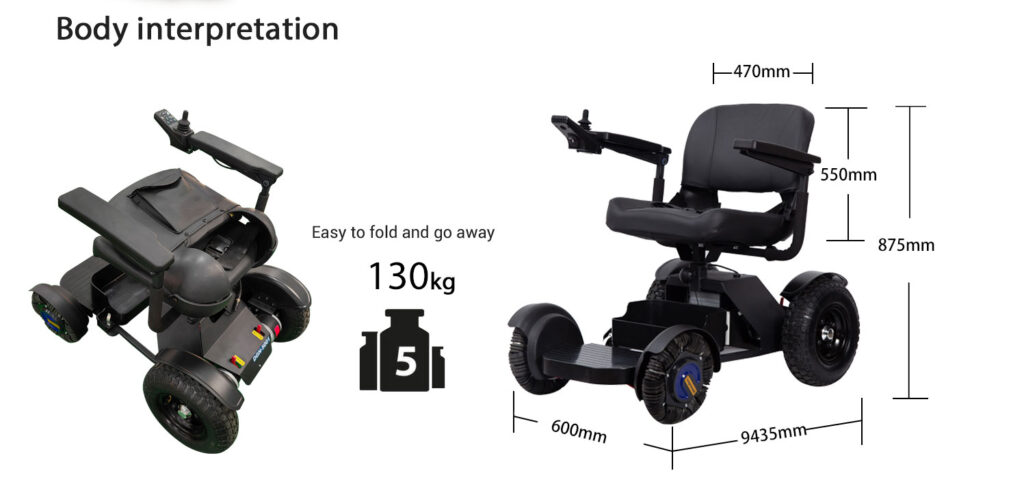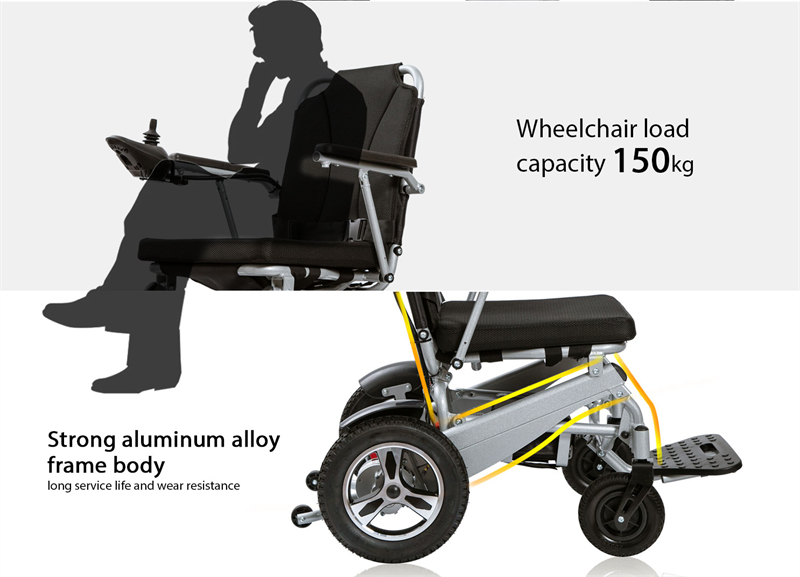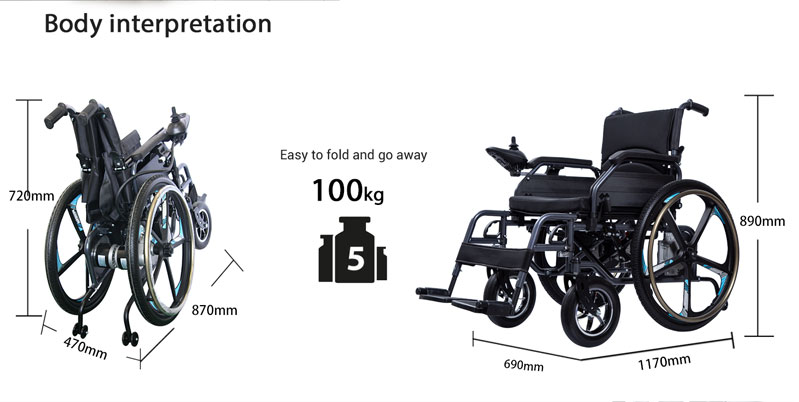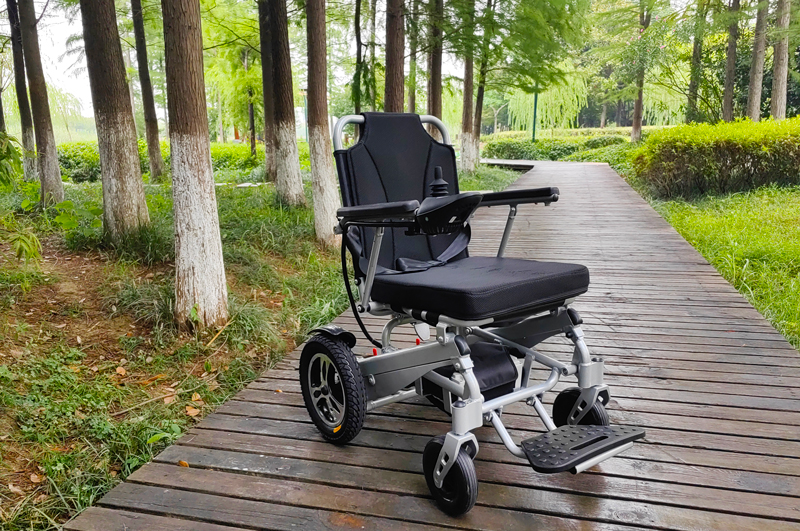How to choose wheelchairs? Choosing the right wheelchair can be a turning point in embracing mobility and independence. It’s a critical choice that affects daily life, whether zipping around your home or exploring the world outside.
Our guide dives into key factors, from manual vs. electric options to ensuring the perfect fit, so you can confidently roll forward. Ready for a smooth ride? Let’s find your ideal match!
Factors to Consider When Choosing a Wheelchair
Navigating the world of wheelchairs can be like finding your way through a maze—chock-full of options and paths. Know this: choosing the right set of wheels isn’t just about getting from point A to B; it’s about matching your lifestyle, body, and needs to a chair that feels almost like an extension of you.
Manual vs. Electric
Choosing a wheelchair involves deciding between manual and electric options. Both types serve different needs and abilities.
- Manual wheelchairs are usually lighter than electric ones. They’re easy to lift and fit into cars.
- Users move manual chairs by pushing the wheels with their hands. This requires good upper body strength.
- If you tire easily or can’t use your arms, an electric wheelchair might be better. It moves with just a joystick or buttons.
- Electric wheelchairs need charging. You need remember to plug them in to keep them running.
- Maintenance for manual wheelchairs is simpler than for power wheelchairs. There are fewer parts that can break down.
- Power chairs often have more features like reclining seats. These extra comforts could be important for you.
- For longer trips, an electric chair can go farther without tiring the user out. Think about how far you travel each day.
- Manual chairs can be less costly up – front and in the long run, since they don’t require batteries or as many repairs.
- Some power chairs are covered by insurance plans. Check if yours helps pay for what you need.
Size and Dimensions

Getting the right fit is crucial for a wheelchair. Seat width should match your hips so you are snug and secure. A chair that’s too big causes slouching, while one that’s too small can squeeze your sides.
Each wheelchair user needs basic measurements taken to find the best size.
Custom made wheelchairs can grow with a child or fit an adult just right. Think about your height, weight, and body shape when picking out a chair. Make sure it supports you well without causing strain or discomfort.
Your comfort matters because you’ll be using this chair a lot!
Arm and Foot Rests
Arm and foot rests are a big deal in wheelchairs. They support your arms and legs, keeping you comfy. Make sure to get the right measurements for these parts. They should fit just right to help prevent soreness.
Choose arm rests that let you move easily without strain. Go for foot rests that keep your feet from dangling or dragging. This can help stop pressure ulcers and other issues. Your ride will be smoother, and you’ll feel better overall.
Storage and Transportation
Choosing the right wheelchair means thinking about how you’ll move it from place to place. Transport wheelchairs are easy for someone else to push and fit nicely into cars. They have small wheels and are lighter than standard wheelchairs.
If you drive a lot or travel often, consider transport chairs.
Look for lightweight wheelchairs if lifting and storing is a concern. Some chairs fold up quickly and can be tucked away in tight spaces. Check that your choice fits in your car’s trunk or backseat easily.
This makes going out less of a hassle for both wheelchair users and their helpers.
Durability

Wheelchairs need to be strong and last long. They must handle different places like streets, parks, or inside homes. Look for one that can take a lot of use without breaking down. Check the frame, wheels, and parts to make sure they are tough.
Some wheelchairs are made for sports and have extra-strong wheels and frames. Always think about how much you will use your wheelchair when picking one out. The right choice means fewer repairs and a better experience day-to-day.
Back Support
Good back support in a wheelchair is key for those who sit for long hours. A solid back helps keep the pelvis steady and boosts comfort. Check the wheelchair’s back monthly to make sure it’s still doing its job well.
This keeps the user comfy and safe.
Choose a chair with sturdy, adjustable support that matches your body shape. Think about how often you’ll be using it when picking out the right kind of backrest. For someone with severe mobility issues, stronger support like this can improve their day-to-day life significantly.
Personal Preferences to Consider
When hunting for your ideal set of wheels, don’t forget to throw personal preferences into the mix—these are the subtle yet crucial touches that transform a chair from serviceable to perfect-for-you.
It’s where comfort meets individuality, ensuring every ride feels tailored just right; after all, nobody knows what clicks for you quite like you do.
Comfort
Sitting in a wheelchair should feel good. Your chair needs to match your body’s size and shape for the best comfort. Think about the cushion and backrest. They should support you well and help prevent sores.
Also, check that the arm and footrests suit your body.
You might spend many hours in your wheelchair each day. That’s why it’s important to pick one that feels right for you. Some chairs have special padding or shapes for extra comfort.
Make sure you try different ones to find what works best for you. Comfort can change how you feel about using a wheelchair every day, so take time to choose wisely.
Ease of Use
Choosing the right wheelchair means looking for one that’s easy to use. If you’re going for a manual chair, think about how hard it can be to push it. This is where power wheelchairs might help because they have big wheels with hand rims.
For electric models, check out the controls. They should be simple and responsive so you can move without trouble.
Think too about daily tasks in your wheelchair. Can you reach things easily? Look into chairs that let you adjust armrests or footplates. Some even fold up, making them good for taking places or storing away at home.
Ease of use also affects how you feel in your wheelchair all day, so make sure it feels right for you and fits well into your life.
Aesthetics
Your wheelchair is more than just a mobility device; it’s part of who you are. Picking the right design and color can show your personality and style. Some people want bright colors or sleek frames to make their wheelchairs stand out.
Others might choose something simple without extra frills.
The look of your wheelchair matters because it reflects your identity. You may wish for special touches that make it unique, like custom patterns or artwork. These details can boost your mood and confidence every time you use your chair.
Your sense of self shines when you pick a chair that looks good to you.
Other Important Questions to Ask
When delving into the selection of a wheelchair, don’t overlook those crucial queries that will shape your decision – think longevity, affordability, acquisition process, and fitting it to your unique lifestyle.
Stay tuned as we explore what really matters in making an informed choice that goes beyond the basic checklist….
How Long Will the Wheelchair Last?
A wheelchair can last a long time if you choose one made of strong materials. The way it’s built also matters for how many years you can use it. Think about how often you’ll be using the chair and your weight; these will affect its lifespan.
A well-cared-for wheelchair might serve you for many years.
Make sure to ask about warranties and ways to fix the chair. Knowing this, you’ll feel better about your wheelchair lasting longer. Good upkeep goes a long way in keeping your assistive device rolling smoothly.
Always check for loose parts or signs of wear and handle them right away.
What is the Cost?
How much does a wheelchair cost ? Wheelchairs range in price depending on their type and features. Power wheelchairs start at about $2,500. But a manual one with no frills might cost much less. You need to think about your budget before making a choice.
Insurance coverage can also help pay for the wheelchair. Often, it covers part or all of the cost if you have a prescription from a nurse or doctor. Check with your insurance provider to see what they will pay for.
Some online stores may offer deals or payment plans that make buying easier, too.
How Do You Obtain a Wheelchair?
To get a wheelchair, start by figuring out what kind you need. Think about if you want one that’s powered or you push yourself. A good place to look is online retail stores; they have many options.
You might also find wheelchairs at medical supply shops or maybe through a local health service.
Talk to your doctor or a specialist for advice on choosing the right wheelchair for your needs. They can help with assessments and work with you to pick one that fits best. If possible, try different wheelchairs before making a choice.
This way, you can see how comfortable and easy they are to use in real life.
Which Wheelchair Type is Best for You?
Choosing the right wheelchair involves matching your daily activities and lifestyle. It’s about understanding which features will help you the most. If you plan to move around a lot indoors, a manual wheelchair might be better.
Its smaller size lets you turn easily in tight spaces. Powerchairs or mobility scooters can travel farther for outdoor use without tiring you out.
Think about sports or hobbies too. A sports wheelchair is designed for basketball, tennis, and other games. They are fast and light, perfect for competition. Durability also matters – some chairs last longer than others due to the high-quality materials used in their construction.
Look at all these things before choosing, ensuring it suits your life perfectly.
Additional Factors to Keep in Mind
When venturing into the world of wheelchairs, it’s not just about the chair itself—but how it fits into your life. Beyond the basics, a host of additional elements come into play that directly impacts your daily comfort—and they’re not to be overlooked..
Mobility Needs
Choosing the right wheelchair means understanding your mobility needs first. Consider how weight distribution affects movement. A good balance between the front and rear wheels can make a big difference.
Also, think about the center of gravity adjustment. This can help with stability and ease of pushing.
Look into biomechanical factors, too. They impact how you’ll move in the chair. For example, how well does it turn? Can it handle different surfaces? Make sure to match these features with your daily activities—whether it’s moving around at home or traveling outside.
Your mobility depends on finding a wheelchair that responds well to your environment and lifestyle.
Weight Range

Wheelchairs come with different weight limits. Basic models can hold between 250lbs and 350lbs. If you need a lighter chair, lightweight wheelchairs max out at around 200lbs. Always check the weight limit before purchasing to make sure it fits your needs.
Your body weight plays a big role in finding the right wheelchair. A chair that’s too weak for your weight may break or not work well. Pick one that can support you safely and comfortably for better mobility and peace of mind.
Physical Conditions
Think about your body’s needs when picking a wheelchair. Age, strength, and any injuries can affect what kind you should get. A person with less endurance might want a light chair that’s easy to move.
If an injury is new, the right support is key to help in healing.
Choosing the best fit also means looking at how long it’s been since the injury happened and any health issues. For those who are older or have certain medical conditions, an electric wheelchair could be better so they don’t use too much energy.
Always check that the chair matches your physical abilities so you stay safe while moving around.
Medications and Supplements
Medications can change how you use a wheelchair. Some drugs make muscles weak or shaky. If you take medicine for your nerves, heart, or muscles, tell this to the person who helps choose your chair.
They need to know so they can find a good fit for you.
Supplements might also affect your choice. Think about things like energy levels and joint health when picking out a wheelchair. Certain vitamins help with bone strength—that’s important if you sit for long times.
Always share what pills or vitamins you take with your healthcare team. They’ll help match you with a wheelchair that suits all of your needs—including the ones related to any medications and supplements you’re on.
Overall Well-Being
Your wheelchair should improve your daily life. It must suit how you live, work, and play. Think about where you’ll use it most—home, outdoors, or at work. Will it help in the places you go often? Make sure your new chair won’t make any area off-limits.
Comfort goes beyond just sitting well. It includes feeling secure and independent. Your mood and energy levels can change based on how good you feel in your wheelchair. Choose one that supports not only your body but also your spirit for a happier, active lifestyle.
Conclusion
Choosing the right wheelchair is a big decision. Think about how you will move, where you’ll go, and what feels good. Make sure it fits your body and can handle your weight. Check if it’s easy to get into a car or store at home.
Always pick one that meets your needs—and makes life better!









